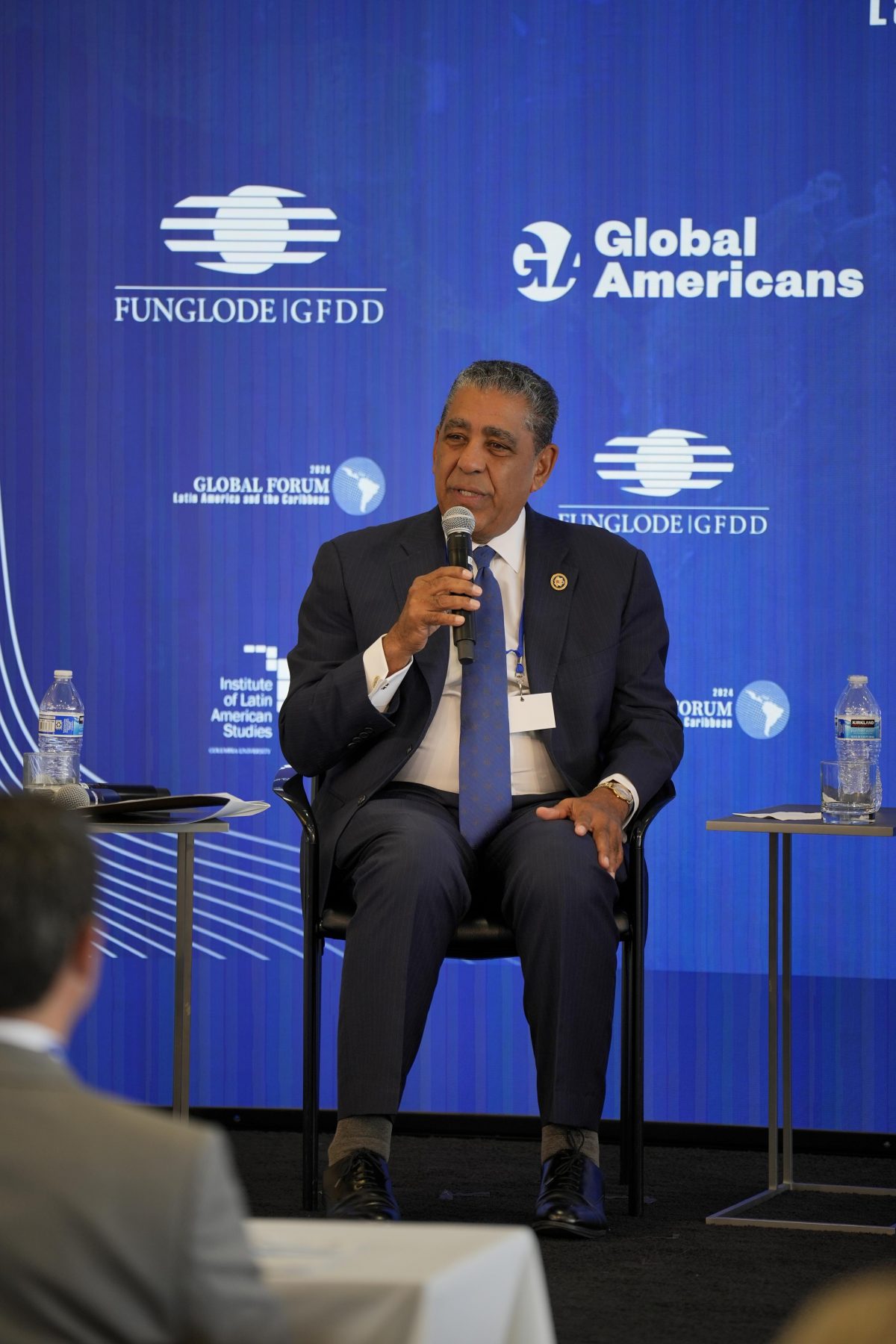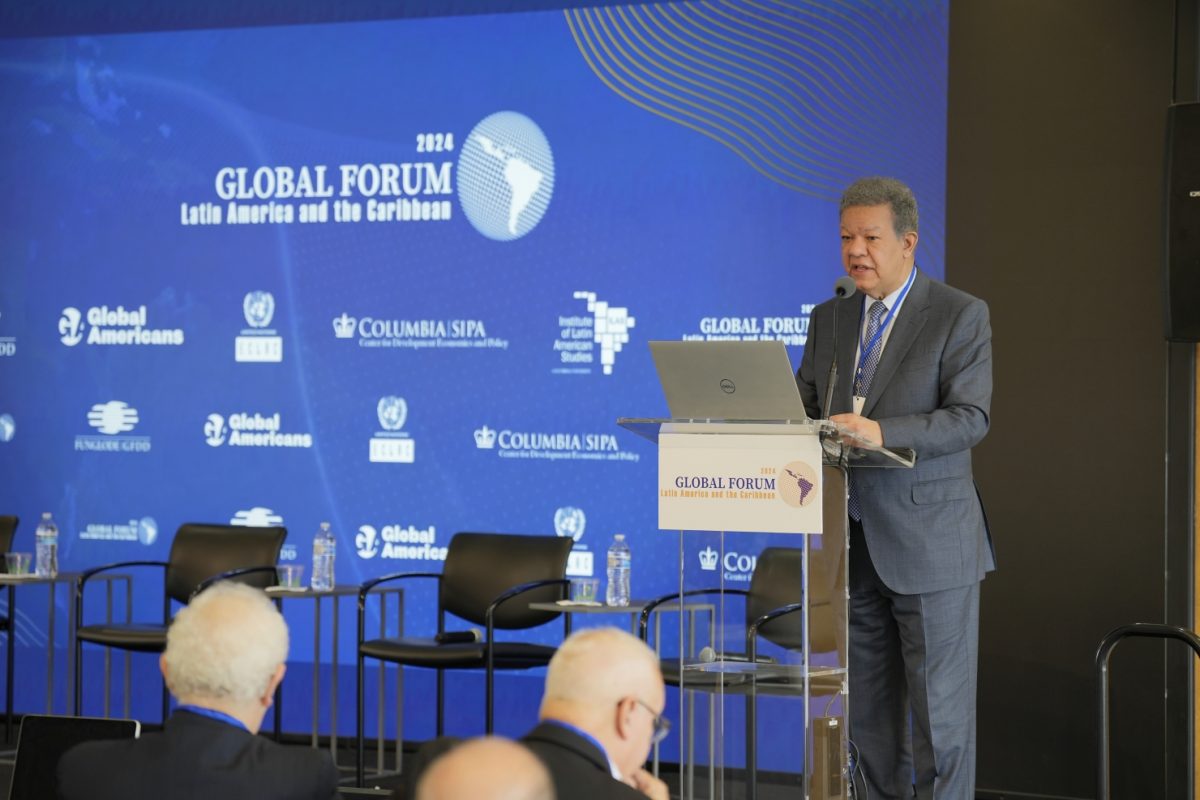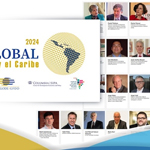These were some of the conclusions reached during the first Panel held during the VI Global Forum on Latin America and the Caribbean 2024, where specialists on specific issues addressed the current situation of the economy and politics of the region.
NEW YORK. Meeting with the objective of analyzing the “Global and Regional Economy and Politics,” experts agreed during this first Panel of the Global Forum on Latin America and the Caribbean 2024, that the priorities of the region include resuming economic growth, assuming the impact of climate change in its public policies and expanding “fiscal space.”
These issues were addressed by José Antonio Ocampo, co-Director of the Economic and Political Concentration at the School of International and Public Affairs, Columbia University; Daniel Titelman, Director of the Economic Development Division of the Economic Commission for Latin America and the Caribbean (ECLAC) and Jorge Heine, professor at Boston University. The panel moderator was Mario Báez, economist and former United Nations official.
Ocampo opened the discussion by addressing the issue in the global and economic context, going from the positive to the negative. On the positive side, he said that the first issue that must be highlighted is the drop in the levels of inflation worldwide, following the invasion of Russia into Ukraine, a situation which generated a dramatic increase in the prices of energy and food products exported by these countries.
‘‘This invasion also generated a general increase in the interest rates of the central banks. We are currently in the downward phase. Clearly, this first reduction cycle made by the Federal Reserve of 50 basic points. In addition to this unusual decision by the Federal Reserve, the second phase was made by the European Central Bank. In Latin America, I must say that we have been attempting to reduce interest rates for several months now,’’ he explained.
In this sense, he said that Latin America is one of the first regions that increased its interest rates. However, it is also one of the first that has begun to lower them. “This fact should somewhat normalize the flow of private capital to Latin America,” he added.
However, he warned of the need to achieve fiscal reforms that allow for the adoption of public policies that provide the population with more quality education and greater development.
He advocated for the creation of production chains in the region, taking into account their resources. We must analyze, country by country, what can be produced in order to increase income and achieve productive developments with the specific opportunities that each nation has, whether in the area of health, food or products, such as electric cars. He also highlighted the lack of investment in research done in the region, with all that this implies.
Meanwhile, Jorge Heine referred to what he called the “poly-crisis”, a situation where massive human confrontations take place. This indicates that in the world, the development of human thought, with all the technological advances and scientific development “that we have had, we cannot somehow confront them.” The “poly-crisis,” he indicated, covers the geopolitical plane, impacts the economic sector, which in turn impacts the environment, and it seems we cannot get out of this.
What is happening? Why is the world going through this, he asked, sharing a reflection by Antonio Gramsci, the prominent Italian philosopher who said: “A crisis is when the world experiences something that has not yet been born, and yet is already ending, a world that is ending and another that has not yet begun.” That is what we are seeing in the international system of our times, Heine emphasized.
He added that we now live under a system that existed from the end of World War II until about 10 years ago, and that today has collapsed. The United States cannot control what Israel does, there is a difference in size, power, everything. The president of the United States announces that a ceasefire is coming and nothing happens. The opposite happens, and it is because the rules that existed in the previous system are no longer in force, and this is what Gramsci calls the interregnum, where many bad things happen. Part of this interregnum – he insisted – is due to the fact that we are moving through a world dominated by the Western powers: the United States, the United Kingdom, and the nations of the North Atlantic.
For the professor, it is not a coincidence that of the 10 cities in the world with the most billionaires, six are in Asia and only two in the United States, one in Europe and another in Moscow. He understands that this is happening because “the action is happening elsewhere today.”
He recalled that he was ambassador to China and India. “I know that world well and that is where things are happening and if we do not understand that, we will not really understand what is happening.”
We are pressured by either Washington or Beijing to do certain things. And, if we don’t do them, they trample us – as we say in Chile. Projects are cancelled, large infrastructure projects, bridges, cables designed to cross the Pacific are suspended. Why? Because one or the other of the great powers doesn’t like it, and in this situation other countries have to realize that they have to choose a different path.
He considered that Latin America is basically moving from the periphery to marginality. And he highlighted that this year the only region in the world that is going to grow less than Latin America is Europe. “This tells us where the world is going. It is going towards the powers that are emerging, and in that framework we, with my colleague, Carlos Fortín, have published a book: “Latin American Foreign Policies in the New World Order: The Active Non-Alignment Option (Anthem Press, 2023)”, regarding this issue. We have called for a different position on foreign policy, he said.
Continuing with the panel, Daniel Titelman began his presentation by taking up the message that Ocampo raised regarding the growth challenge in the region. “Professor Ocampo told us that we are going through another lost decade. That is correct. And, there is a great challenge in the region because the drop in regional growth is already a structural issue. And, when one looks and compares from the air, after the decade of the eighties of the last century, after the debt crisis, what we see is a constant fall in the average growth rate and in the growth train of the region,” he said.
So -he argued- we face a great challenge on how we are going to reactivate growth in the region, which is not a minor issue. With an estimated growth so far, for this year, of only 1.8%, of approximately 2.3% for 2025, it is evident, he said, that the trend of low growth continues.
Regarding climate change, he said that in the organization to which he belongs they have been making calculations in relation to the challenge that this represents for the region “and we have seen that if the region does not make the investments in mitigation and adaptation that it has to make.” It will have a very negative impact not only on the planetary level, but also on the dynamics of growth, and our simulations suggest that if the region does not make the investments it requires, by 2050 the level of product in the region would be between 1%2 and 14% below what it would be if one maintains the current train, which we already said is mediocre.
Climate change is negatively affecting the region’s ability to grow through its negative impact on productivity. He warned that the calculations they have made already indicate a relationship between the fall in the GDP growth rate and the negative effects of climate change. They have estimated, he said as an example, that by 2050, “we would lose about 43 million jobs due to climate shocks in the region, which is equivalent to almost 10% of the workforce.”
So, said Professor Heine, facing the challenge of growth, we must take charge of climate change, “which at the same time is an opportunity to boost growth. He regretted that the traditional social problems of inequality that the region has are being joined by a great challenge for growth and also for equality, which is the challenge of climate change. He also mentioned that Latin America is the region that invests the least in the world in this sector.
In numbers, investment is around 19.5% and 20% of the GDP, while investment in emerging and developing countries in Asia, these investment numbers have risen to 33%. In emerging Asian nations, these percentages are approximately 40%. And we are still below developed countries. Therefore, the investment challenge, where the region has to boost growth and face climate change, is very difficult in a region that invests little and has strong macroeconomic restrictions.
On a more positive note, he agreed with Ocampo on the reduction in inflation in the region, with lower interest rates, which reduce financial costs. There is much progress to be made to maintain the low interest rates, as inflation is declining, he said.
The Forum
The event is organized by the Global Foundation for Democracy and Development (Funglode) and its sister institution in the United States, the Global Foundation for Democracy and Development (GFDD), in coordination with the Center for Development Economics and Policy (CDEP). The forum has the support of the United Nations Economic Commission for Latin America and the Caribbean (ECLAC), the Institute of Latin American Studies at Columbia University (ILAS) and the think tank Global Americans (GA).
Regarding the speakers:
José Antonio Ocampo, co-Director of the Economic and Political Development Concentration at the School of International and Public Affairs, member of the Committee on Global Thought and the Initiative for Policy Dialogue at Columbia University. He is also a member and past chair of the Committee on Development Policy, a committee of experts of the United Nations Economic and Social Council (ECOSOC), and was chair of the Independent Commission on the Reform of International Corporate Taxation (ICRICT) from 2015-2022. He is still a member of the Commission.
Daniel Titelman is currently Chief of the Development Studies Section (United Nations-ECLAC). Previously, he was the Coordinator of the Special Studies Unit of the Executive Secretariat of ECLAC. He is an expert on issues related to Monetary and Financial Policies. Mr. Titelman has extensive and substantive experience in macroeconomic and financial issues, and has published numerous studies on these topics. He is currently the focal point for the topic of financing for development at ECLAC. He also coordinates the ECLAC/GTZ Programme entitled: “Towards Sustainable and Equitable Development”, component 4(b): Social Policy and Access to Financial Services Aimed at Combating Poverty (financing).
Jorge Heine is a research professor at the Frederick S. Pardee School of Global Studies and Interim Director of the Pardee Center for the Study of the Long-Term Future, Boston University. Former Chilean Ambassador to China, India and South Africa, he has also been a cabinet minister in the Chilean government. Former Vice President of the International Political Science Association (IPSA), he has been a visiting professor at the universities of Konstanz, Oxford, Paris and Tsinghua, and has published 17 books. His latest books are: “Latin American Foreign Policies in the New World Order: The Active Non-Alignment Option (Anthem Press, 2023), and Xi-Na in the Century of the Dragon: What Everyone Should Know About China (lom, 2022).









